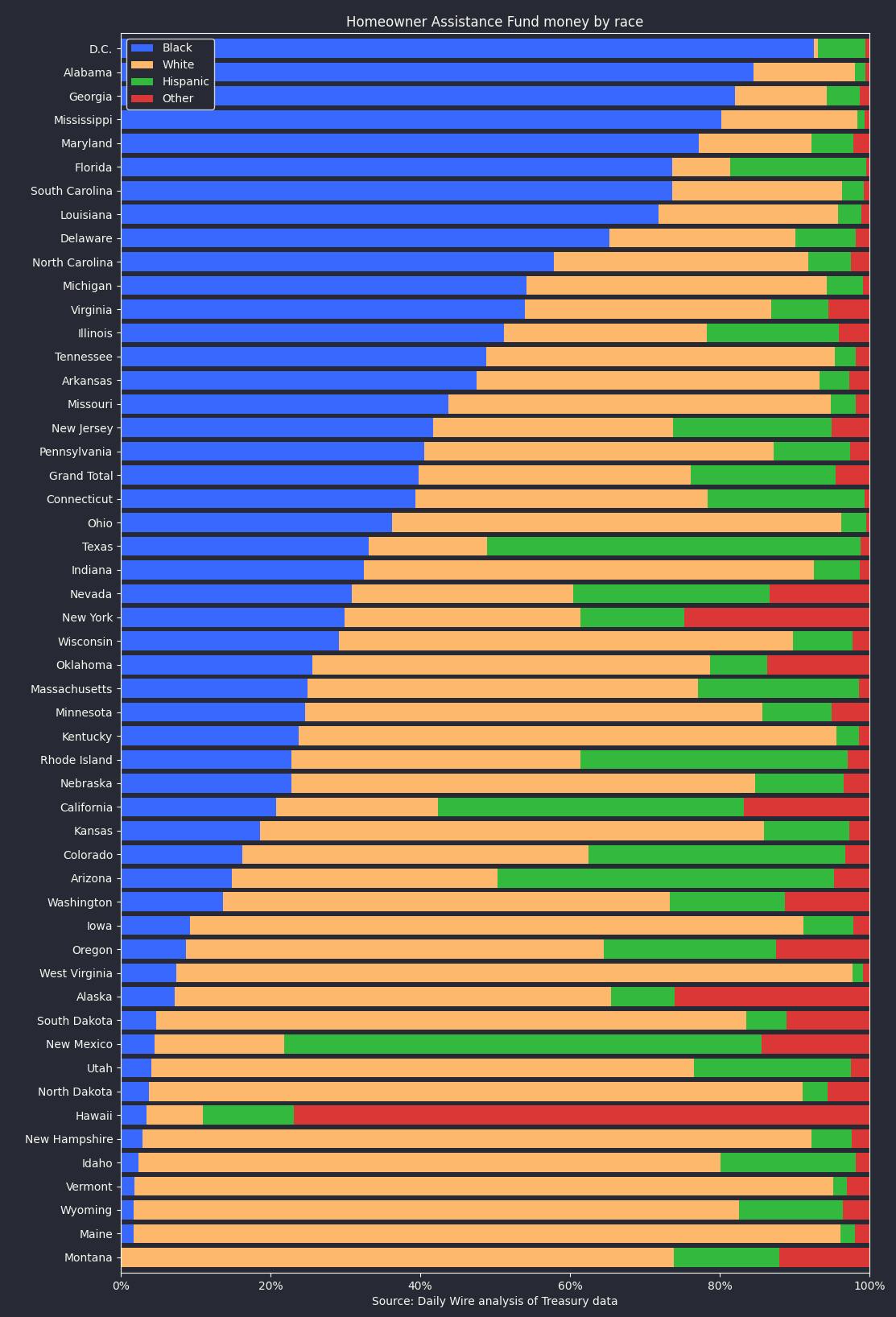A coronavirus-era housing bailout program spent $10 billion paying Americans’ mortgages and homeowner association dues. But explicit racial preferences steered nearly half of the funds to black Americans, who make up just 12% of the population, a Daily Wire analysis found.
The Homeowner Assistance Fund is one of the largest race-based government wealth transfers in history. It has largely escaped scrutiny since it launched amid a global pandemic and a stream of other federal bailouts. But now, white residents in several states have filed lawsuits alleging that they were illegally discriminated against.
The lawsuits target Republican-led states that the plaintiffs say went along with the program in Joe Biden’s American Rescue Plan, even though it was up to each state to implement its own rules, and the Biden administration offered racial criteria only as non-binding suggestions.
In Georgia, for example, 82% of the funds — made up of payments for up to $50,000 — went to blacks. Only 13% went to whites, and 4% went to Hispanics. The lawsuit argues that this can’t be due to income disparities alone, given the high rate of poverty among white people in the state.
“This dramatic difference cannot be explained by income disparities or other race-independent reasons,” a lawsuit filed in January says. “For example, comparing census and poverty rate data, about 50.5% of Georgia citizens below the poverty line are black and 45.6% are white.”
The lawsuit is against the state’s Department of Community Affairs, whose leaders are appointed by Governor Brian Kemp, a Republican who has led the state since 2019. It alleges that the $354 million plan submitted by Georgia, and approved in January 2022, to use the funds included plans for a public awareness campaign that would send text messages to residents in “30 out of Georgia’s 152 counties” that were selected based on, among other things, “minority population.”
The state also “approved applications from applicants of its preferred racial and ethnic groups at a higher rate than those from white applicants. Out of all non-white applicants, about 20.04% of applicants were approved while out of all white applicants, about 12.74% of applicants were approved,” the suit says.
The federal program required that each state allocate at least 60% of the funds to homeowners with incomes below the median. People with higher-than-average incomes could get the remaining money, but that portion “must be prioritized for assistance to socially disadvantaged individuals, with funds remaining after such prioritization being made available for other eligible homeowners.”
In other words, poor people of all races could always qualify for the grant, but certain other groups could also get it because they’re “disadvantaged,” even though they actually had more money than most.
The lawsuit stated that Congress had not defined “socially disadvantaged individuals.” But in April 2021, the Biden administration “provided a recommended definition” that said “Socially disadvantaged individuals are those who have been subjected to racial or ethnic prejudice or cultural bias … There is a rebuttable presumption that the following individuals are socially disadvantaged: Black Americans, Hispanic Americans, Native Americans, Asian Americans and Pacific Islanders.”
Georgia, Missouri, and Oklahoma are being sued after the deep-red states chose to adopt that definition, even though it was optional, unlike other states. Deep-blue California, for example, administered the housing-cost bailout by defining socially disadvantaged as residents who live in Census tracts where the ratio of housing costs to available income has historically made residents most vulnerable to foreclosure. Texas defined it as people who “reside in a Persistent Poverty County.”

Kemp spokesman Carter Chapman declined to discuss why Georgia adopted the race-based definition, instead saying he has a record of “fighting DEI in our state,” including signing bills restricting childhood gender transitions. The state’s Department of Community Affairs did not return a request for comment.
Georgia Attorney General Christopher M. Carr is seeking to have the lawsuit dismissed, filing a motion in June that stated the state’s use of race was “entirely consistent with the Treasury’s definitions.”
“The Treasury’s and DCA’s definition of socially disadvantaged individuals included, but was not limited to, people who had been subject to racial prejudice, and it also included those who have been subject to cultural bias, which is not a racial classification,” Carr says.
“The program allowed white applicants to be considered socially disadvantaged merely by submitting an affidavit stating that they ‘identify as a Socially Disadvantaged Individual,’” he wrote.
Carr is a Republican who has held his position since 2016 and has criticized DEI policies elsewhere, including at Costco and the American Bar Association. Carr spokeswoman Kara Murray told The Daily Wire that “Attorney General Carr had no involvement in the implementation of this program in Georgia. Once the lawsuit was filed, our office’s role was to defend the State in court, and that’s what we have done.”
In Missouri, the program was implemented by the Missouri Housing Development Commission, a 10-person board that includes the state’s governor, lieutenant governor, treasurer, and attorney general — all of whom are Republicans.
Yet when the federal government asked Missouri how it would define “socially disadvantaged individual,” it said it would adopt “Treasury’s definition of socially disadvantaged individuals,” and use software that would flag people as disadvantaged in part based on which box they checked when asked about race and ethnicity.
A lawsuit said that “In marketing and advertising its program to inform Missouri citizens about the availability of funds and how to apply, MHDC targeted outreach to racial minorities,” including partnering with the Black Chamber of Commerce and the Hispanic Chamber of Commerce. Forty-four percent of the loan money went to black residents, who make up less than 12% of the population.
Missouri Governor Mike Kehoe was a member of the housing commission during the program’s inception, serving in his then-role as lieutenant governor. Kehoe spokeswoman Gabby Picard said “As this is pending litigation, we are not able to comment on the specifics of this case,” but that “Kehoe has been a strong advocate for removing DEI within state government,” signing an executive order “directing all Missouri state agencies to eliminate Diversity, Equity, and Inclusion (DEI) initiatives and ensure compliance with the constitutional principle of equal protection under the law.”
Missouri Attorney General Andrew Bailey, a Republican, was not a member of the housing commission when the state decided how to implement the federal program because he took office in 2023. But Bailey responded to the lawsuit in court papers in May, writing that “Defendants were merely administering a federal program in accordance with federal mandates, rules, guidelines, regulations, and/or applicable laws … The Defendants applied neutral criteria when administering the program. Defendants acted in good faith reliance on Treasury and federal guidance, and had no reason to believe the program would have a discriminatory impact.”
Bailey joined the Trump administration last month as co-deputy director of the FBI. A spokeswoman for his old office, Abigail Bergmann, told The Daily Wire that “the Biden Administration applied pressure to states to adopt these policies, and Missouri’s program was established before Attorney General Bailey was elected to office. As Attorney General, it is his statutory duty to represent MHDC in court. But thanks to his leadership, MHDC today has been stripped of the Biden-era racist policies that Missourians should never have been subjected to in the first place.”
In Oklahoma, five white residents who did not receive housing assistance, including a massage therapist who lost her job due to the pandemic and her disabled-veteran husband, sued the Oklahoma Housing Finance Agency. “On the front page of its Oklahoma Homeowner Assistance Fund program website, OHFA stated that a homeowner is a socially disadvantaged individual if the homeowner is a “[m]ember of a group that has been subjected to racial or ethnic prejudice or cultural bias within American Society: African American, Hispanic/Latino, Native American, LGBTQ+,” the suit said.
That website says residents of “minority-majority census tracts” are also among the “socially disadvantaged” who “are eligible to receive a one-time grant award up to a maximum of $35,000.” It states that applications were accepted until March 2024. The state allocated $87 million, and 26% of it went to black residents, despite their making up only 7% of the state’s population.
The lawsuit said “Because of this race-based classification, a white or Asian homeowner with household size of 3 in Oklahoma County, Oklahoma, could not apply for relief in 2023 if the homeowner’s income was greater than $96,200 (100% AMI) unless he or she could otherwise qualify as socially disadvantaged, but a black or Latino homeowner with the same household size could apply with an income of up to $116,110 (150% AMI). This is just one of many ways in which OHFA’s race-based program discriminated against white and Asian homeowners.”

Oklahoma Governor Kevin Stitt speaks during CPAC (Photo by Lev Radin/Pacific Press/LightRocket via Getty Images)
It said OHFA worked with the African Methodist Episcopal Church to market the program.
“OHFA specifically informed socially disadvantaged individuals about the program and assisted those individuals through the application process but did not do the same for white or Asian homeowners. This made it more likely that individuals deemed socially disadvantaged based on race would receive funding at the expense of white and Asian homeowners who were eligible to receive funding but to whom OHFA did not provide the same information or assistance,” the suit said.
“OHFA could have administered its program in a race-neutral way. Instead, it discriminated against white and Asian homeowners in favor of homeowners from preferred racial groups. But COVID-19 did not discriminate. Oklahoma homeowners of all races needed assistance. OHFA’s racial discrimination is plainly unlawful,” it said.
All of Oklahoma’s top officials are Republican, and a board appointed by the governor runs the Oklahoma Housing Finance Agency. The housing board’s chair, Michael Buehl, was appointed in 2019 to a five-year term by Governor Kevin Stitt. Stitt then re-appointed him in 2024, after Buehl oversaw the race-based program. Stitt did not return a request for comment.
The housing agency is currently vigorously defending the program, hiring private lawyers who filed a motion to dismiss the lawsuit in March. The motion said that according to the Attorney General, OHFA is classified as a “state beneficiary public trust” that is “separate and distinct from” the state.
A spokesman for Oklahoma Attorney General Gentner Drummond, who has publicly opposed DEI and stated in 2023 that one of his priorities was investigating the misuse of COVID funds, did not respond to questions.



